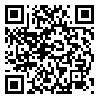Volume 6, Issue 2 (8-2019)
Human Information Interaction 2019, 6(2): 24-31 |
Back to browse issues page
Download citation:
BibTeX | RIS | EndNote | Medlars | ProCite | Reference Manager | RefWorks
Send citation to:



BibTeX | RIS | EndNote | Medlars | ProCite | Reference Manager | RefWorks
Send citation to:
Ojaghi N. Investigating the Predicting Role of Online Searching Skills in Envisaging Research Self-Efficacy of Payamnoor Postgraduate Students. Human Information Interaction 2019; 6 (2)
URL: http://hii.khu.ac.ir/article-1-2709-en.html
URL: http://hii.khu.ac.ir/article-1-2709-en.html
Abstract: (7636 Views)
Background and aim: New technologies, particularly the Internet, have changed the means of information searching and retrieval in innumerable research methods, as well as qualitative research. Therefore, researchers awareness of search skills is imperative. Search skills allows pursuit of higher self-efficacy. So, the purpose is to investigate the Role of Online Searching Skills in Predicting Qualitative Research self-efficacy of Payamnoor University Postgraduate students.
Methodology: The research method was correlational descriptive - analytical study. Population was 277 Postgraduate Students of Payamnoor University and sample of 159 students were selected randomly. For data collection, Online Searching skills and Qualitative Research Self efficacy questionnaires were applied. Regression analysis was used to analyze the data.
Results: The results indicate that there is a relation of Online Searching skills and Research Self efficacy. Also, regression coefficient indicates that Online searching skills could predict research self-efficacy factors of Payamnoor University postgraduate students.
Conclusion: Based on the findings, emphasizing on online search skills and training might lead to an upsurge of self-efficacy of Postgraduate students at this University in qualitative research.
Methodology: The research method was correlational descriptive - analytical study. Population was 277 Postgraduate Students of Payamnoor University and sample of 159 students were selected randomly. For data collection, Online Searching skills and Qualitative Research Self efficacy questionnaires were applied. Regression analysis was used to analyze the data.
Results: The results indicate that there is a relation of Online Searching skills and Research Self efficacy. Also, regression coefficient indicates that Online searching skills could predict research self-efficacy factors of Payamnoor University postgraduate students.
Conclusion: Based on the findings, emphasizing on online search skills and training might lead to an upsurge of self-efficacy of Postgraduate students at this University in qualitative research.
Keywords: Online Searching Skills, Qualitative Research Self-efficacy, Payamnoor Postgraduate Students, Internet.
References
1. Bailey, P., Derbyshire, J., Harding, A., Middleton, A., Rayson, K., Syson, L. (2007). Assessing the impact of a study skills programme on the academic development of nursing diploma students at Northumbria University, UK. Health Information & Libraries Journal. 24(s1); 77-85. [DOI:10.1111/j.1471-1842.2007.00741.x] [PMID]
2. Brand-Gruwel, S., Wopereis, I., Wal raven, A. (2009). A Descriptive model of information problem solving while using internet. Computers & Education. 53(4); 1207-12175. [DOI:10.1016/j.compedu.2009.06.004]
3. Doyle, T., Hammond, J. (2006). Evaluating the internet as a research source reference ervices Review. Academic Research library.34(1); Available from http://www.emeraldinsight.com/0090-7324.html. [DOI:10.1108/00907320610648761]
4. Forster, M. (2015). Six ways of experiencing information literacy in nursing: The findings of a phenomenographic study. Nurse education today. 35(1); 195-200. [DOI:10.1016/j.nedt.2014.06.005] [PMID]
5. Geravand, h., Karshki, h., Ahanchiyan, M.( 2014). The Relationship between Self-efficacy in Research and Research Performance; A study on Students of Medical Sciences University of Mashhad, Iranian Journal of Medical Education. 14(1). [Persian]
6. Henley, B. F. (2009). Developing eLearning: A Case Study of Tennessee High School. A Dissertation for Doctor of Education, Tennessee State University, Tennessee.
7. Karaseva, A. (2016). Relationship of Internet self-efficacy and online search performance Inventory to Assess Self-Efficacy. The Journal of Academic Librarianship; 31(2).
8. Patterson,A .(2009). A needs analysis for information literacy provision for research: a case study in university . Journal of information literacy.3(1); 5-18 . [DOI:10.11645/3.1.210]
9. Larkin, J. E., Pines, H. A. (2004). Developing information literacy and research skills in introductory psychology: A case study. Academic Librarianship. 40-45. [DOI:10.1016/j.acalib.2004.09.008]
10. Mahdiyan, M.J., Shahbazi, S.h., Niknejad, M.( 2012 ). Assessing the skills of using electronic databases and digital libraries as one of the dimensions of information literacy in postgraduate students, Journal of Epistemology. 5(17); 61-69. (Persian)
11. Mehrad, j., Rahimi, F. (2009). Investigating the Factors Affecting Continuous Search Skills of Graduate Students at Shiraz University, The journal of Studies in Education and Psychology. 10(2); 49-66. (Persian)
12. Miller, J. (2014). Building academic literacy and research skills by contributing to Wikipedia: A case study at a university, Journal of Academic Language & Learning .8( 2); A72-A86. ISSN 1835-5196.
13. Monoi, S., O'hanlon, N., Diaz, K.R. (2005). Online Searching Skills: Development of a secondary school teachers, International Conference; Meaning in Translation: Illusion of Precision. [DOI:10.1016/j.acalib.2004.12.005]
14. Rezaeesharifabadi,S.(2004). Qualitative Internet Research: Methods and Challenges. Women Studies.2(5);66-86.
15. Salehi M. (2011). The effective factors on the self-efficacy and research motivation of students according to social-cognitive theory of Bandura [dissertation]. Mashhad: Ferdowsi university of Mashhad; (Persian).
| Rights and permissions | |
 | This work is licensed under a Creative Commons Attribution-NonCommercial 4.0 International License. |






